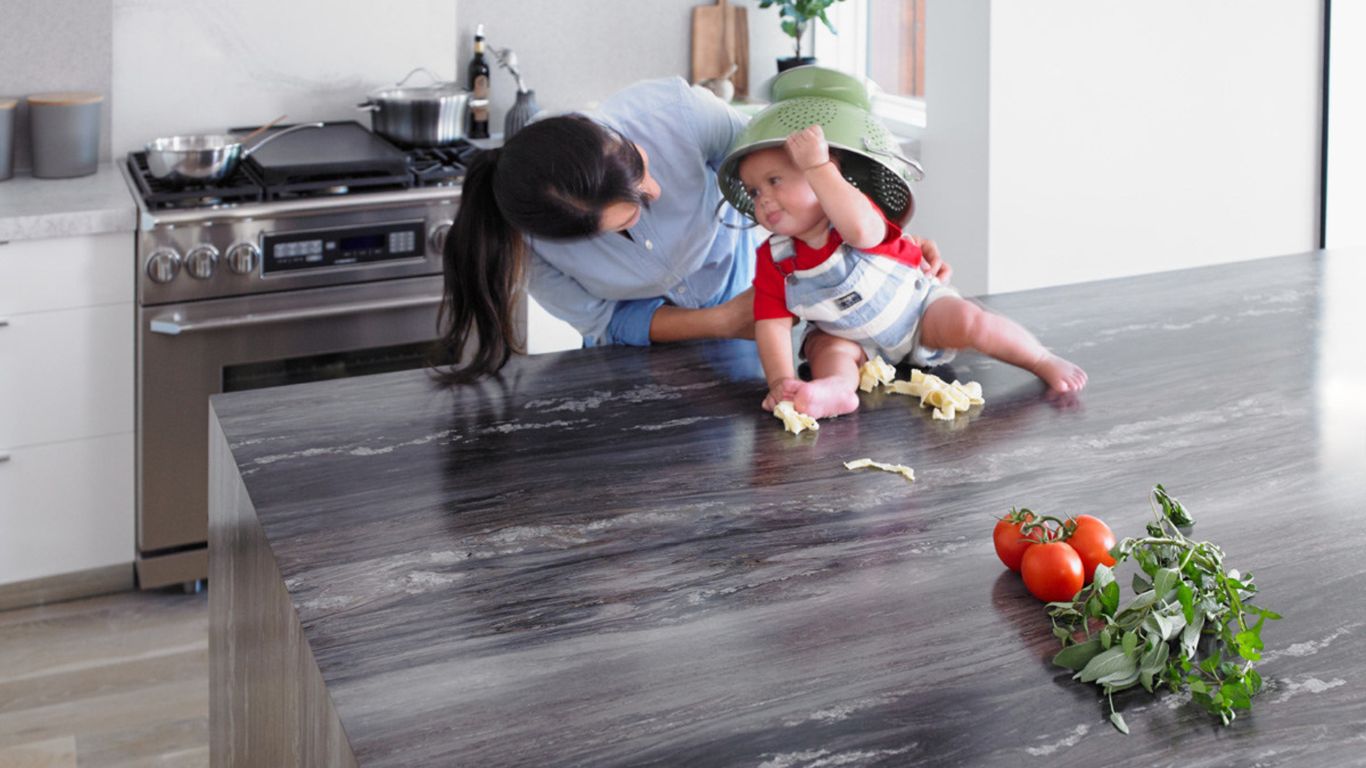Kitchen countertops are not just a part of your kitchen’s aesthetics; they are the workhorses of your culinary space. Different countertops, from quartz to granite, each come with unique cleaning and maintenance needs and characteristics. Let’s dive into kitchen countertops and discover how to clean them and keep them in pristine condition, ensuring they remain functional and beautiful for years to come.
How to Clean Countertops?
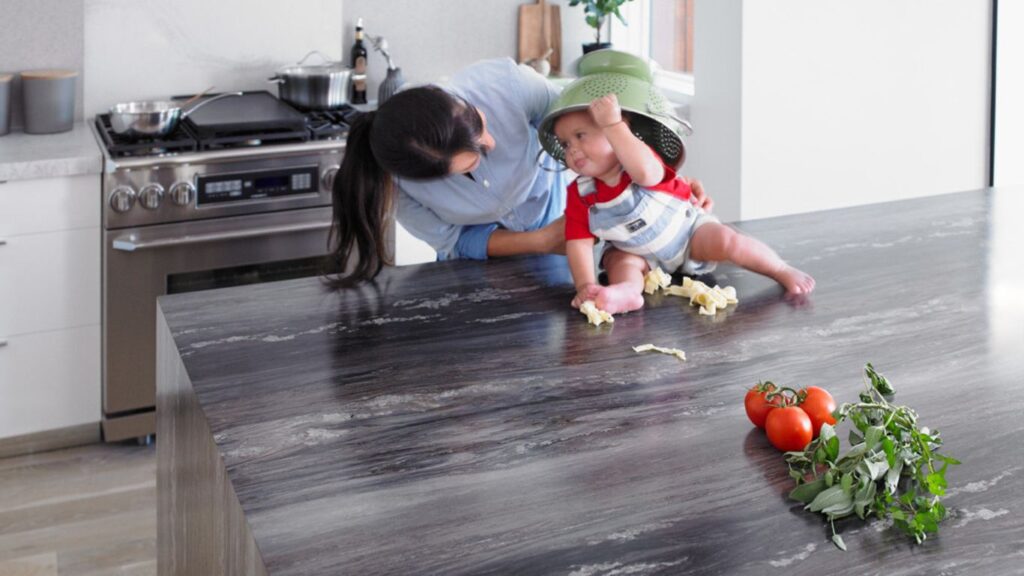
Maintaining the pristine appearance of your countertops doesn’t have to be a complex task. Here’s a straightforward cleaning guide suitable for all types of countertops:
1. Initial Wash:
- Start by using a sponge and soapy water to wash the countertop.
- Dishwashing detergent works perfectly for this task.
- After washing, rinse the countertop thoroughly.
2. Drying Technique:
- Utilize a microfiber cloth for drying to prevent streaks and blotches.
- Take a few seconds to ensure the surface is completely dry.
3. Soap and Water Magic:
- Nearly every countertop manufacturer emphasizes the effectiveness of soap and water for regular maintenance.
- Avoid abrasive cleaners of any kind, as they can damage the surface.
4. Cleaner Caution:
- If you opt for a cleaner, even one designed for your specific countertop material, perform a test in a small, inconspicuous spot before applying it widely.
Cleaning and Maintenance Tips for Different Countertops
- Quartz: Daily cleaning with a soft cloth and mild detergent is sufficient. Avoid harsh chemicals and abrasive cleaners. For tough stains, a gentle scrub with a non-abrasive pad can help.
- Granite: Use a pH-neutral cleaner and avoid acidic or abrasive cleaners. Wipe spills immediately, and re-seal the countertops as recommended, usually once a year.
- Marble: Clean with a soft cloth and pH-neutral cleaner. Avoid vinegar or citrus-based cleaners. Use coasters and cutting boards to protect the surface, and re-seal periodically.
- Laminate: Wipe with a damp cloth and mild detergent. Avoid scouring pads and bleach. A paste of strong baking soda and water can be gently applied for stubborn stains.
- Butcher Block: Clean with mild soap and water and dry immediately. Oil the surface regularly with food-grade mineral oil to maintain its luster and prevent drying.
- Concrete: Wipe with a pH-neutral cleaner and avoid vinegar-based solutions. Waxing can enhance its stain resistance. Watch for cracks and re-seal as necessary.
Best Practices for Longevity
Use Trivets and Cutting Boards
Protect your valuable kitchen countertops from heat and scratches by using trivets for hot pots and cutting boards for chopping.
Immediate Spill Cleanup
Promptly clean spills, especially on porous surfaces like granite and marble, to prevent staining.
Regular Sealing
Follow the recommended sealing schedule for natural stone countertops to maintain their resistance to stains and damage.
Avoid Harsh Chemicals
Steer clear of bleach, ammonia, or abrasive cleaners that can damage the countertop surface.
Professional Help for Repairs
Consider hiring a professional to ensure the job is done correctly for chips, cracks, or re-sealing.
Types of Kitchen Countertops and Their Characteristics
- Quartz Countertops: Known for their durability and wide range of colors, quartz countertops are non-porous, making them resistant to stains. They don’t require sealing and are relatively easy to maintain.
- Granite Countertops: Each granite slab is unique, with varied patterns and colors. Granite is porous and requires periodic sealing to prevent stains. It’s resilient but can crack if subjected to sharp temperature changes.
- Marble Countertops: Marble adds timeless elegance to any kitchen but is more prone to scratching and staining. Regular sealing is necessary, and acidic substances should be wiped off immediately to prevent etching.
- Laminate Countertops: Affordable and available in numerous designs, laminate countertops are low-maintenance but can be damaged by heat and aren’t as durable as stone options.
- Butcher Block (Wood) Countertops: These offer a warm, natural look and are great for chopping and food prep. However, they require regular oiling to prevent drying and cracking.
- Concrete Countertops: Customizable and trendy, concrete countertops need to be sealed to resist stains and water. They can develop a unique patina over time but might crack.
Balancing Style, Practicality, and Maintenance
When choosing kitchen countertop materials, homeowners should consider various factors in the context of maintenance, care, and cleaning, ensuring that their choice aligns with their lifestyle, cooking habits, and household dynamics. Here are some key considerations:
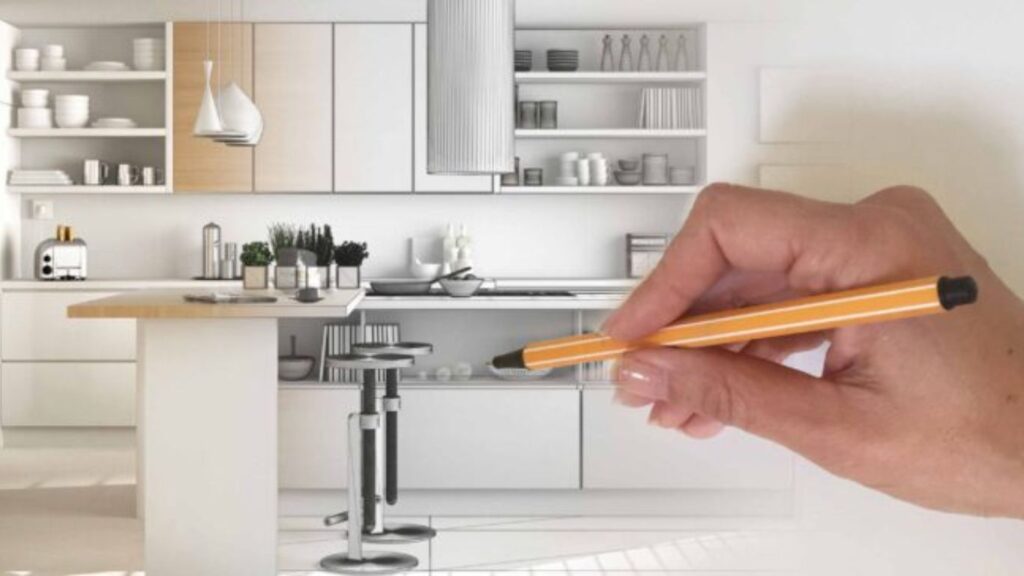
Cooking Frequency and Style:
Choosing a durable and low-maintenance countertop like quartz or granite is advisable for those who cook frequently or enjoy experimenting with various ingredients. These materials resist heat and scratches better, accommodating regular use and occasional mishaps. If you often use heavy pots or sharp utensils, avoid softer materials like marble, which can scratch and chip more easily.
Presence of Children:
Homes with children might prioritize safety and ease of cleaning. Laminate countertops, being non-porous and easy to wipe down, are practical choices. They also resist stains from common spills like juice or food dyes. However, if you prefer natural stone, quartz is a robust and less porous option, reducing the risk of bacterial growth from spilled foods and liquids.
Pets in the Home:
A scratch-resistant material is crucial for pet owners, particularly those with cats that may jump onto counters. Granite and quartz can withstand the occasional scratch better than softer stones. Additionally, non-porous surfaces are preferable for easy cleaning of pet hair and potential messes.
Aesthetic Preferences vs. Practical Needs:
While marble offers a luxurious look, it requires more maintenance and care. Homeowners who prefer a hassle-free countertop might opt for engineered stones like quartz, which offer a wide range of designs while being more forgiving on maintenance.
Budget Considerations:
Budget plays a significant role in material choice. Natural stones can be more expensive and require regular sealing, adding to long-term maintenance costs. Laminate or tile countertops offer a budget-friendly alternative but might have a different longevity or resistance to heat and wear.
Sensitivity to Chemicals:
For those who prefer eco-friendly or less harsh cleaning methods, materials like quartz and solid surface countertops can be cleaned effectively with mild soap and water, reducing the need for strong chemicals.
Climate and Sunlight Exposure:
In areas with a lot of natural sunlight, consider UV resistance. Certain materials, like some quartz and solid surfaces, may discolor over a long time when exposed openly to direct sunlight. Granite and tiles may be more resistant to fading.
Long-term Durability vs. Short-term Aesthetics:
While some materials might look stunning initially, they may only hold up well over time with proper care. It’s essential to balance the desire for a particular aesthetic with the reality of maintenance and longevity. For instance, butcher block countertops add warmth but require regular oiling to maintain their condition.
How To Clean Your Quartz Countertops?
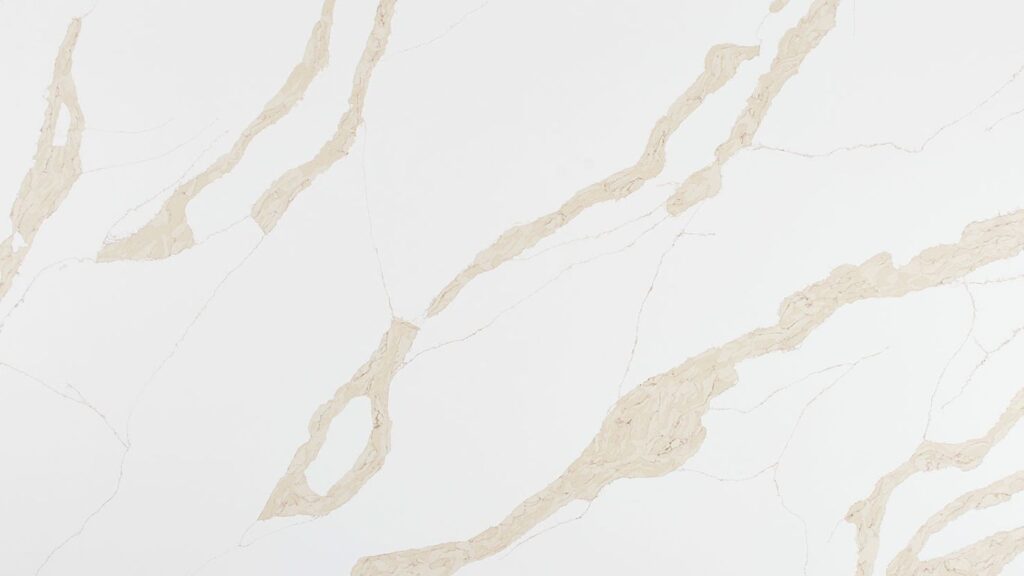
Your kitchen deserves the beauty and practicality of quartz countertops; with the right care, they will continue to shine for years to come. By understanding the variety of quartz countertop colors and how they complement different cabinet styles, you can create an amazing kitchen that reflects your personal taste. Additionally, mastering the art of cleaning quartz countertops ensures that they remain as stunning as the day they were installed. With these tips and best practices in mind, you can confidently enjoy the elegance and functionality of your quartz countertops for generations to come.
Easy Tips for Quartz Countertop Care and Maintenance
Quartz countertops enhance the aesthetic appeal of your kitchen and boast durability. To keep them looking their best, follow these simple care and cleaning tips:
- Gentle Cleaning: Clean your quartz surfaces with ease using a mild detergent, water, and a soft cloth or paper towel. Avoid abrasive cleansers and harsh scouring pads, as they can damage the surface. After cleaning, rinse thoroughly and dry to maintain the quartz’s distinctive shine.
- Special Finishes: Some quartz colors and finishes, like honed or matte, may be more sensitive to grease or fingerprints. Give them extra care during routine cleaning to preserve their beauty.
- Commercial Environments: For larger commercial spaces, consider using a floor machine like a slow-speed buffer or walk-behind scrubber. Ensure thorough rinsing to eliminate any haze residue that might dull the countertop’s shine.
- Protective Measures: To prevent scratches, avoid using metal knives and utensils directly on the countertop. When chopping or slicing, use a cutting board. This simple practice goes a long way in maintaining the pristine look of your quartz surface.
- Grease Stains: Address grease stains promptly by using a stone care product recommended for quartz. Steer clear of harsh cleansers, and gently scrape away hardened grease with a plastic knife before applying the cleanser.
How to Clean Your Granite Countertops?
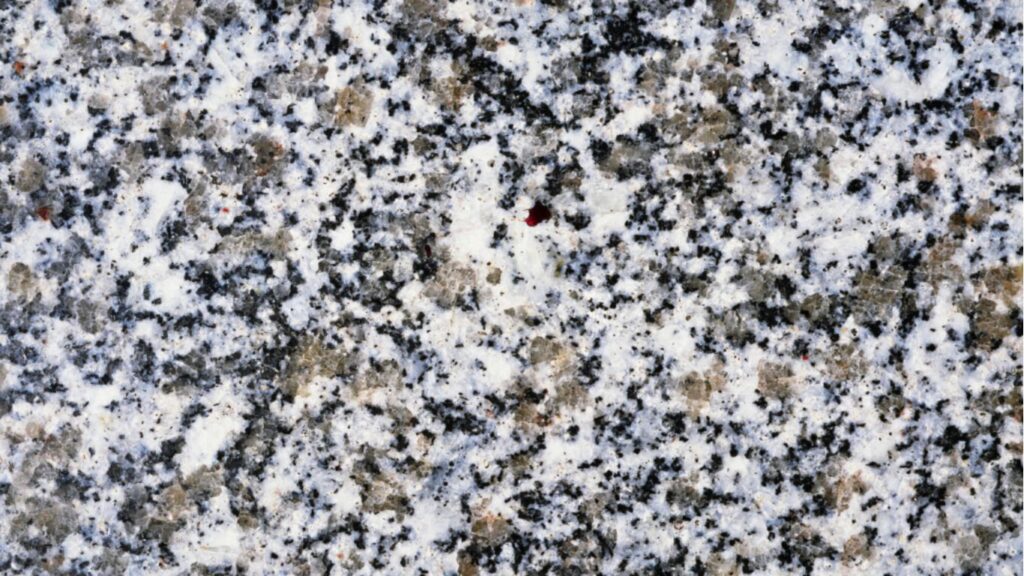
After ensuring your countertops are sealed to resist spills, it’s crucial to adopt the right daily cleaning routine for maintaining the beauty of your granite surfaces. Follow these steps for the best way to clean granite countertops:
1. Daily Cleaning Routine:
- Swiftly wipe away spills and crumbs using a damp cloth or sponge.
- Avoid abrasive cleaning pads and harsh chemicals, which can harm the surface and sealant.
- Use warm water and a few drops of dish soap for regular cleaning.
- DIY Granite Cleaner: Mix equal parts rubbing alcohol and water; add your favorite essential oil for a pleasant aroma.
- Wipe down counters with a cloth to prevent water spots.
2. Use Appropriate Cleaning Products:
- Opt for pH-neutral cleaners specifically recommended for natural stone surfaces.
- Steer clear of abrasive or acidic cleaners, including vinegar, as they can damage the stone’s finish.
3. How to Remove Stains from Granite:
Granite’s porous nature may lead to stains, but you can effectively address them:
- Create a paste of baking soda and water.
- Apply the paste on the stain with a soft sponge, working it into the stone. Gently scrub the counter with a soft cloth and rinse thoroughly. Repeat as necessary.
- For persistent stains, apply a paste layer and let it sit overnight.
- Wipe the granite with a soft cloth to reveal your stain-free, gleaming surface.
How to Clean Marble Countertops?
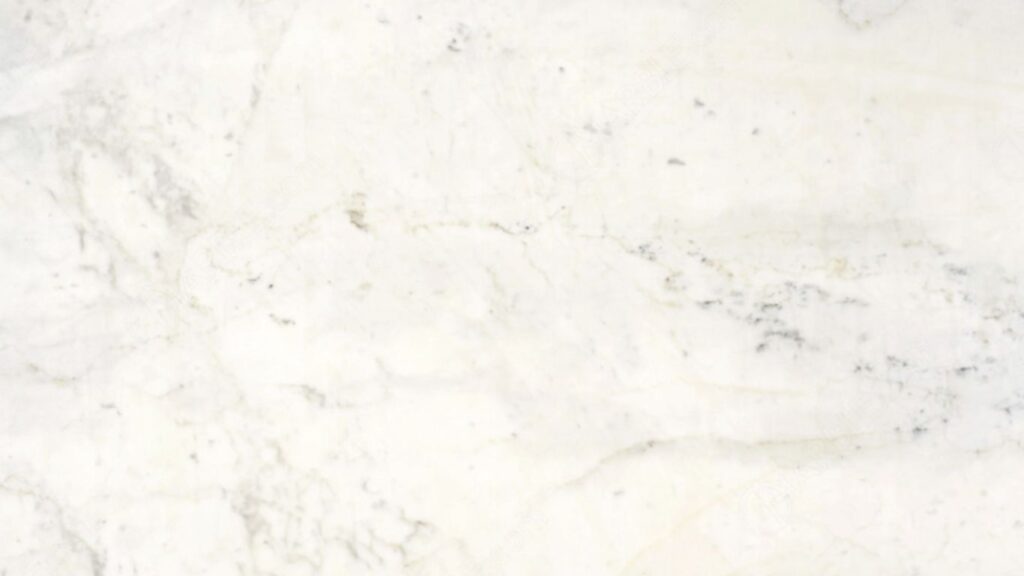
Marble countertops, though exquisite, demand specific care to preserve their beauty and durability. Composed of calcium carbonate, marble is sensitive to acids in various foods and cleaning products, including vinegar and lemon juice. Harsh substances like bleach and ammonia can also harm marble over time. Additionally, abrasive cleaners and sponges should be avoided as they can dull the finish.
A step-by-step guide for cleaning, polishing, and sealing your marble countertops:
Materials Needed:
- Dry microfiber cloth
- Damp cloth
- Spray bottle
- Neutral pH stone cleaner
- Mild dish soap
- Marble sealant (if required)
- Marble polishing powder
- Baking soda
Instructions for how to clean marble countertops
1. Wipe with a Cleaner or Mild Soap:
Use a damp cloth with a pH-neutral stone cleaner or a mixture of mild dish soap and water to clean the countertop. Gently wipe and scrub with a damp, soft cloth.
2. Rinse with a Damp Cloth:
Wipe the counter with a clean, damp cloth or towel. Rinse the cloth with water and wipe until all suds are gone.
3. Dry with a Soft Cloth:
Prevent spots or streaking by drying the countertop with a soft cloth or towel.
4. Dust Weekly:
Dust at least once a week using a soft microfiber cloth.
5. Polish Occasionally as Needed:
Sprinkle baking soda on the countertop and rub gently with a damp cloth to polish the surface. Wipe away the soda with a damp towel and dry it with a soft cloth. For mild etching, use an approved marble polishing powder.
6. Seal as Directed:
Regularly seal your countertops as the manufacturer recommends or when water no longer bleeds on the surface. Sealing prevents damage from stains and maintains the beauty of marble countertops.
Final Suggestion on How to Clean Countertops
Your kitchen countertops are an investment in your home’s beauty and functionality. By understanding the specific needs of your countertop material and adhering to these care and maintenance tips, you can ensure that they remain a stunning and practical feature in your kitchen. Whether you’re meal prepping on a butcher block or serving appetizers on gleaming quartz, proper care will keep your countertops looking their best for years to come. Happy cooking and entertaining in your beautifully maintained kitchen!
